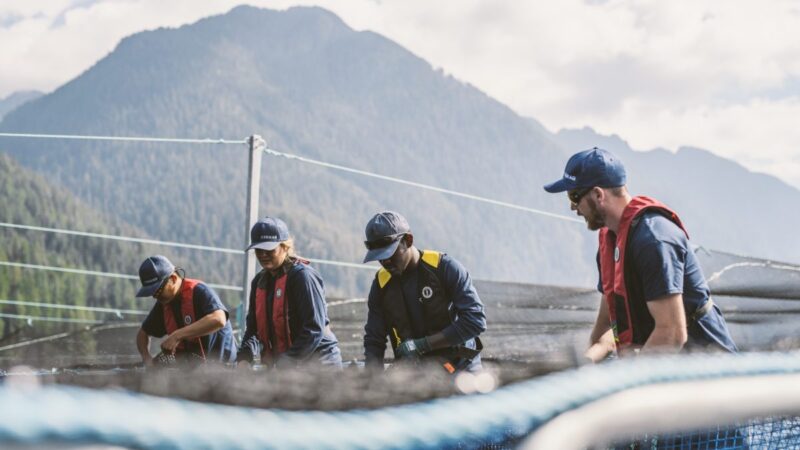Fact checking the anti-fish farm fiction
“While anti-farming opponents rely on outdated and fabricated misinformation to spin their fiction, the world is moving ahead with sustainable salmon aquaculture”
Commentary
By John Paul Fraser
An excerpt of a book written from an activist perspective about salmon farming that appeared in the Times Colonist on Nov. 29 would make for entertaining fiction if its false claims were not aimed at undermining an important local food production industry.
It’s a shame the author attempted to delve into something out of her scope of knowledge without checking the facts.
Headlined “Murky waters,” the piece paints a picture of salmon farms as fly-by-night operations using a long list of toxic chemicals created for the Second World War, literally dumping substances such as DDT directly into the water through chutes on every farm, workers being poisoned pulling handfuls of chemicals out of bags and tossing them in the water.
Really? Such chutes don’t exist.
We don’t use Second World War chemicals. Workers don’t grab chemicals out of bags and throw them in the water. We don’t dump tonnes of pesticides, herbicides and fungicides into the water.
It’s fiction. Made up. Absurd.
None of those hideous activities are allowed under current Canadian law, and they’re not practices we’d consider using, out of concern for the health of our fish, our people and the environment in which we operate.
Clearly, the author who writes about salmon farming has never actually visited a farm.
The claims would be laughable if they were not so likely to stick in readers’ minds because they appeared in black and white in a reputable publication. Unfortunately, they add to the misinformation about salmon farming that further serves to discredit a responsible and modern industry. If fake news had a definition, this would be it.
I hope to clear some of this up.
Like all good fictions, this one is based on a kernel of truth. For example, the excerpt makes the claim that our industry adds a scary-sounding chemical called canthaxanthin to fish food, then spins a tale about how the chemical has been banned for some uses and causes all sorts of problems.
What the piece fails to mention is that canthaxanthin is part of a family of naturally occurring pigments that give some shellfish (shrimp, crabs, etc.) and salmon their signature orange-red colour.
Known as carotenoids, these pigments are antioxidants and essential to fishes’ health. Just like anything else, too much can be harmful, so salmon-feed producers carefully craft their product to make sure it has just the right amount of this important nutrient.
The article claims we use a long list of chemicals, including dichlorvos, an insecticide that in the past was commonly used on both land- and water-based farms.
It hasn’t been used in salmon farming for many years. Just as other food-production industries, pretty much any industry, through science and observation we learned some substances are harmful and stopped using them, years ago. We’ve evolved, kept current.
Today, salmon on our farms are only given antibiotics or other medicine when needed, only given medicines approved by strict federal guidelines after rigorous testing, and only under the prescription by a veterinarian. These are the modern, responsible practices Canadians expect from any farming sector today.
Unfortunately, what can get lost in all of this misinformation is just how important salmon farming is to Vancouver Island, and all of B.C. More than three-quarters of the salmon harvested in B.C. comes from our farms. We provide more than 6.5 million meals worth of salmon every week.
We have been deemed an essential service during the COVID-19 pandemic, doing our part to ensure Canada’s food security during this crisis.
We support almost 7,000 good jobs in B.C., most of those on Vancouver Island. A recent report from an independent economist found we have the potential to create almost 10,000 new jobs by 2050, and are playing a key role in helping communities recover from the COVID-19 pandemic.
While anti-farming opponents rely on outdated and fabricated misinformation to spin their fiction, the world is moving ahead with sustainable salmon aquaculture.
Just this month, the United Nations’ Food and Agriculture Organization published its annual Fisheries and Aquaculture report, finding more than half the world’s seafood is farmed, and that figure will increase as the world’s population grows and wild stocks continue to be under pressure. It’s an important industry, globally.
On Dec. 2, Canada signed on to the 14-nation Ocean Action Agenda, committing to sustainably managing 100 per cent of national waters. The pledge is consistent with our work developing new sustainable technologies and practices on a foundation of current science, so B.C.’s responsible salmon farming sector can play a key role in achieving this important goal.
In an increasingly divisive world, it’s time we start putting facts first again, and have meaningful, constructive dialogue so we can work together toward our mutual goal of having healthier oceans.
John Paul Fraser is the executive director of the B.C. Salmon Farming Association.
(Image courtesy of Cermaq shows workers at one its sites.)

